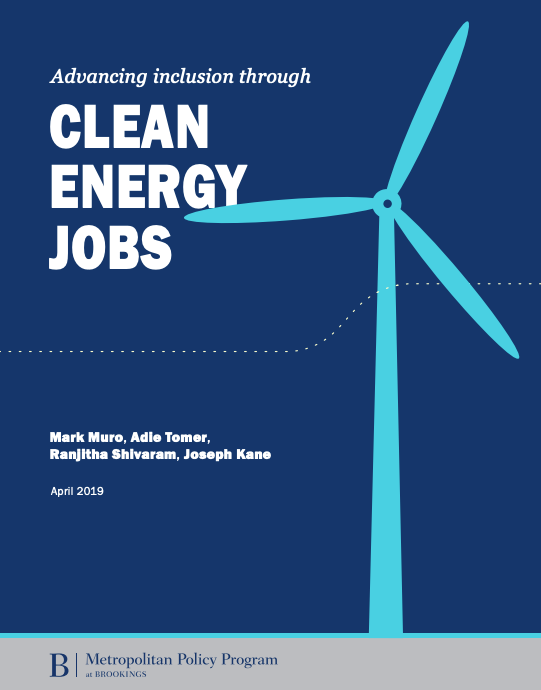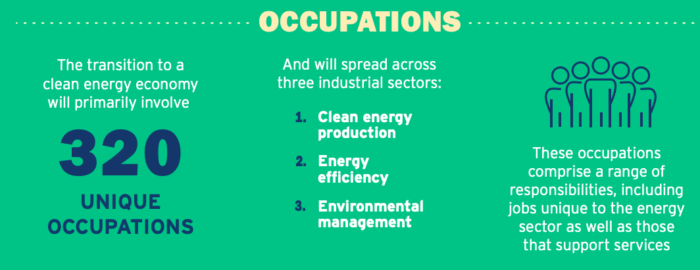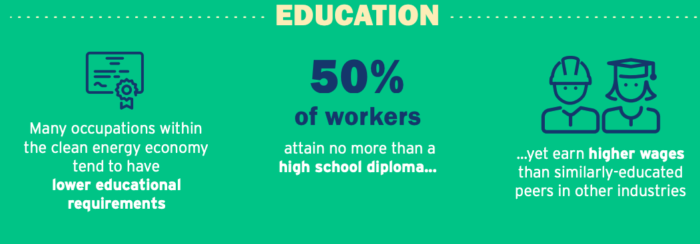Brookings Metropolitan Policy Program
Executive Summary
T he transition to a clean energy economy continues. Motivated by mounting scientific evidence, shifting market forces, and in some cases policy, U.S. industries have responded by installing more zero-carbon energy sources, developing more energy-efficient products, and adopting more environmentally-sensitive standards. More recently debates have broken out in Congress over the need for an ambitious Green New Deal centered on clean energy economy employment. As a result, shifts in “green jobs,” carbon emissions, electricity consumption, and resilience to climate shocks have become some of the highest-profile, most-debated trends of the decade.
he transition to a clean energy economy continues. Motivated by mounting scientific evidence, shifting market forces, and in some cases policy, U.S. industries have responded by installing more zero-carbon energy sources, developing more energy-efficient products, and adopting more environmentally-sensitive standards. More recently debates have broken out in Congress over the need for an ambitious Green New Deal centered on clean energy economy employment. As a result, shifts in “green jobs,” carbon emissions, electricity consumption, and resilience to climate shocks have become some of the highest-profile, most-debated trends of the decade.
While much has been written about all of those topics, considerably less attention has been paid to how all this intersects with the workforce. Over the years, assessments of the “clean” or “green” economy have often focused on “sizing” the sector by counting associated jobs under various clean energy activities. These counts are vital, confirming the extent of the country’s energy evolution. Yet they tell us little about the nature of work and the occupations necessary to deliver a functional clean energy economy moving forward.
Focused squarely on the workforce side of the clean energy transition, this analysis intends to help energy-sector professionals, state and local policymakers, regional education and training sector leaders, and community organizations get a clearer look at the nature, needs, and opportunities associated with the future clean energy workforce. In particular, this analysis aims to explore the extent to which such occupations will offer inclusive pathways to economic opportunity.
Using federal datasets and industrial classifications from prior clean energy economy research, this report finds that:
- The transition to the clean energy economy will primarily involve 320 unique occupations spread across three major industrial sectors: clean energy production, energy efficiency, and environmental management. These occupations represent a range of workplace responsibilities, from jobs unique to the energy sector to support services found throughout the broader economy.
- Workers in clean energy earn higher and more equitable wages when compared to all workers nationally. Mean hourly wages exceed national averages by 8 to 19 percent. Clean energy economy wages are also more equitable; workers at lower ends of the income spectrum can earn $5 to $10 more per hour than other jobs.
- Even when they have higher pay, many occupations within the clean energy economy tend to have lower educational requirements. This is especially true within the clean energy production and energy efficiency sectors, which include sizable occupations like electricians, carpenters, and plumbers. Roughly 50 percent of workers attain no more than a high school diploma yet earn higher wages than similarly-educated peers in other industries.
- Occupations within the clean energy production and energy efficiency sectors tend to require greater scientific knowledge and technical skills than the average American job. Conversely, knowledge and skill requirements in environmental management occupations trend towards national averages.
- The clean energy economy workforce is older, dominated by male workers, and lacks racial diversity when compared to all occupations nationally. Fewer than 20 percent of workers in the clean energy production and energy efficiency sectors are women, while black workers fill less than ten percent of these sector’s jobs.
These results confirm the transition to a clean energy economy could help address economic inclusion challenges from the national to the local level. However, the current roster of workers in related occupations is far from inclusive— suggesting the existence of distinct barriers to access that require additional attention and action.
Introduction
The U.S. economy is in the midst of a dramatic energy transition.
In the face of a changing climate, rising sea levels, and various national security concerns, market forces—assisted by public policy—continue to shift key portions of the American economy away from carbon-intensive, fossil fuel driven activities toward cleaner, more efficient, and higher-output ones, especially through greater energy efficiency and more use of renewable energy sources.
Consumers are changing their behavior and increasingly seeking greener alternatives as new products flood the marketplace. Businesses are launching new innovations, shifting production schedules, and bringing cleaner products and services to the market to serve them. And with the recent promotion by climate activists of an ambitious Green New Deal, fiery policy debates have broken out in Congress over the need for investments in clean-energy jobs and infrastructure.
As a result, big changes in consumption patterns, manufacturing processes, the power sector, and regulatory affairs—all related to the shift to reduced carbon emissions—have become some of the highest-profile, most-debated trends of the decade.
While much has been written about all of those trends, less attention has been paid to how all this intersects with the American workforce—even though “green jobs” lie at the center of the Green New Deal vision. This is a gap in the debates, given that the clean-energy transition impacts and crucially depends on having an appropriately skilled workforce to carry out the wide range of activities associated with this economy-wide effort. These activities range from assembly line laborers to manufacture energy-saving products, tradesman to construct energy-efficient buildings, or technicians to operate renewable energy facilities. The continued expansion of the American clean energy sector may well have significant implications for the American labor market, education and training institutions, and the need to locate more durable, family-supporting jobs with limited barriers to entry at a time of widening income inequality and a shrinking middle class.
Yet, it has been hard to get a clear sense of the labor market opportunities that are emerging during this transition. With more attention focused on demonstrating the size and growth of today’s clean energy economy industries, much less research has drilled down on the characteristics of the occupations involved in the transition. And most research has not closely examined the skills required for such jobs or the demographic and educational profile of those who fill them; one notable exception is a recent UC Berkeley study examining diversity in California’s clean energy workforce.
Focused squarely on the workforce side of the clean energy transition, the following analysis is intended to help energy-sector professionals, state and local policymakers, regional education and training-sector leaders, and community organizations get a clearer look at the nature, needs, and opportunities associated with the future clean energy workforce.
Building on existing definitions of the clean energy sector, this report first moves to classify the broad range of occupations implicated in this economy-wide transition and employ a novel methodology using Bureau of Labor Statistics and O*NET data to characterize the individuals who currently fill those positions. The analysis then uses the earnings, educational background, skills development, and demographics of this workforce to characterize how inclusive the future clean energy economy is likely to be. Finally, the report concludes with top-line implications for the businesses, workforce development organizations, and government actors who will help develop the clean energy economy workforce.
The resulting analysis projects great promise for the U.S. labor market and household opportunity as the clean energy economy transitions continues to push forward. Yet delivering economy-wide prosperity based on the inclusive nature of many clean energy economy occupations will require a more concerted effort to ensure all individuals can fill these jobs.
Download full version (PDF): Advancing inclusion through Clean Energy Jobs
Download Infographic (PDF): Clean Energy Workforce
About the Metropolitan Policy Program at Brookings
www.brookings.edu/program/metropolitan-policy-program
“Cities and metropolitan areas are the hubs of the national and global economy and the primary places where people seek jobs and opportunity. They are at the forefront of the major demographic and social changes confronting the nation. Our mission at the Metropolitan Policy Program is to deliver research and solutions that help metropolitan leaders build an advanced economy that works for all.”
Tags: Brookings Institution, Clean Energy, clean energy economy, clean energy jobs, labor force, Metropolitan Policy Program, Renewable Energy











 RSS Feed
RSS Feed